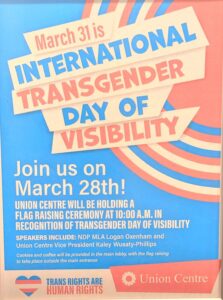 Join Local 998 and Union Activists from across Manitoba for the International Transgender Day of Visibility
Join Local 998 and Union Activists from across Manitoba for the International Transgender Day of Visibility
Union Center at 275 Broadway will be holding a Flag Raising Ceremony at 10:00am in recognition of Transgender Visibility
The International Transgender Day of Visibility was founded in 2009 by Rachel Crandall-Crocker a trans activist, psychotherapist and executive director of the nonprofit advocacy group Transgender Michigan. Rachel wanted a reason to come together and feel joy with other members of the trans community. “I wanted a day that we could focus on the living,” Crandall-Crocker said. “And where we could have rallies all as one community all the way around the world.”
On May 30, 2024, The Two-Spirit and Transgender Day of Visibility Act was passed in the Manitoba legislature designating March 31 an annual day to recognize two-spirit and transgender persons. The bill was brought forward by Logan Oxenham MLA for Kirkfield Park in Winnipeg and Canada’s first transgender politician elected to provincial, territorial or federal office.
“Two-Spirit” and “Trans” identities are intertwined with Indigenous cultures and the LGBTQ+ movement, with “Two-Spirit” emerging as a term in 1990 to describe Indigenous people who embody both masculine and feminine spirits, while “Trans” is a broader term for individuals whose gender identity differs from their sex assigned at birth. We also recognize that these identities and many other gender nonconforming identities have existed throughout recorded history and beyond.
Two-Spirit:
The term “Two-Spirit” emerged in 1990 at the Third Annual Inter-Tribal Native American, First Nations, Gay and Lesbian American Conference in Winnipeg, coined by Elder Myra Laramee to describe Indigenous people who embody both masculine and feminine spirits.
In many Indigenous cultures, Two-Spirit people held important social and spiritual roles, often as healers, visionaries, and community leaders, and were respected for their ability to bridge the gap between genders.
European colonization and the imposition of Western gender norms led to the suppression of Two-Spirit identities and roles, with many Two-Spirit people facing discrimination and marginalization.
Today, “Two-Spirit” is an umbrella term used by some Indigenous people to describe their gender, sexual, and spiritual identity, and it is a way to reclaim and celebrate Indigenous traditions and identities.
Two-Spirit is a pan-Indigenous term, and not all Indigenous cultures use it or have the same understanding of it. Many Indigenous cultures have their own specific terms and concepts for gender-nonconforming people. |
Trans:
“Trans” is a broader term used to describe individuals whose gender identity differs from their sex assigned at birth, encompassing a wide range of identities, including transgender, non-binary, and genderqueer.
The concept of gender variance has existed in many cultures throughout history, but the term “transgender” emerged in the late 20th century to describe individuals who identify as a gender different from their assigned sex.
Trans people have historically faced discrimination and marginalization, and the struggle for recognition and acceptance continues today.
Trans identities intersect with other identities, such as race, ethnicity, sexual orientation, and socioeconomic status, and trans people of color, Two-Spirit people, and other marginalized groups experience unique forms of discrimination.
Trans people have played a significant role in the LGBTQ+ rights movement, advocating for their rights and challenging gender norms. |
Additional resources:
CUPE’s Bargaining Beyond the Binary: A negotiating guide for trans inclusion and gender diversity.
CUPE’s info sheet on Pronouns and Gender Diversity.
Truth and reconciliation: CUPE taking action through collective bargaining
Canadian Labour Congress Workers in Transition Guide
